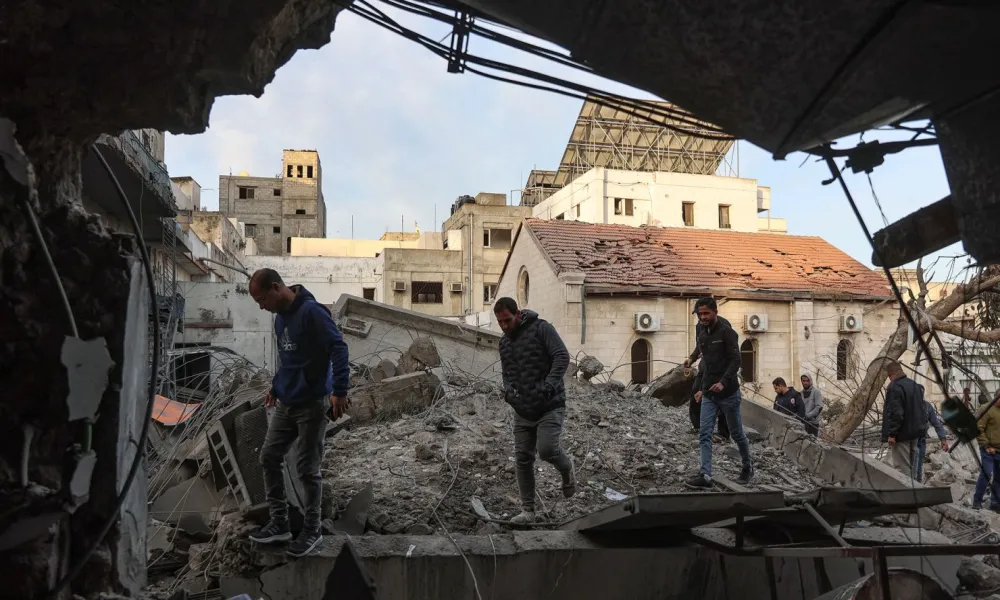An Israeli airstrike on the Nasser Hospital complex in southern Gaza has killed at least 15 people, including three Palestinian journalists, according to local health authorities. The incident, which took place on Monday, has sparked international outrage and renewed scrutiny of Israel’s military tactics in the ongoing war.
Among the victims was Hussam al-Masri, a cameraman working on assignment for Reuters, as confirmed by the news agency. Two other journalists, photographer Hatem Khaled, who had worked for several international outlets, and freelancer Ahmad Abu Mustafa, were also killed. Palestinian officials said doctors, patients, and civilians sheltering at the hospital were among the dead, with dozens more injured.
WARNING: GRAPHIC CONTENT
— Reuters (@Reuters) August 25, 2025
Video shows the moment a second strike hit Nasser hospital in Khan Younis, as emergency responders were removing the bodies of those killed in another strike minutes earlier https://t.co/DXtTbrTRJq pic.twitter.com/J2kHVop0Ez
The Israeli military acknowledged conducting what it described as a “precision strike” near the hospital, claiming the target was a Hamas command post embedded in the area. Officials insisted they are reviewing the reports of civilian casualties but maintained that Hamas routinely uses medical facilities as cover for its fighters. Hamas and local medical staff have denied the allegation, calling the attack a deliberate strike on a protected civilian site.
The New York Times reported that al-Masri’s death marks the second time in less than a year that a Reuters journalist has been killed in Gaza, underscoring the dangers faced by media workers covering the war. Press freedom groups, including the Committee to Protect Journalists, condemned the attack and demanded an independent investigation, stressing that hospitals and journalists are protected under international law. The International Federation of Journalists called the strike “an intolerable assault on truth and humanity.”
Four Palestinian journalists killed after IOF struck the upper floor of the Nasser Hospital in Khan Younis.
— لينة (@LinahAlsaafin) August 25, 2025
-@Reuters cameraman Hossam al-Masri
-Al Jazeera photojournalist Mohammad Salama
-Freelancer Maryam Abu Daqqa
-NBC’s Muath Abu Taha
Stop this madness. pic.twitter.com/z5D2sOiSW2
The United Nations issued a strong rebuke, with Secretary-General António Guterres reiterating that hospitals must never be targeted and that the killing of journalists “strikes at the heart of accountability and transparency in war.” Human rights organizations echoed these concerns, pointing to a growing pattern of strikes on medical facilities across Gaza. Médecins Sans Frontières described the attack as part of a “systemic disregard for the laws of war.”
The strike has intensified diplomatic pressure on Israel. European Union officials expressed alarm and called for an urgent ceasefire, while Qatar and Egypt warned that continued attacks on hospitals could derail fragile mediation efforts. The White House, while reaffirming Israel’s right to self-defense, urged “greater care to avoid civilian harm,” a line that has become a recurring refrain as civilian casualties mount.
Israel deeply regrets the tragic mishap that occurred today at the Nasser Hospital in Gaza.
— Benjamin Netanyahu - בנימין נתניהו (@netanyahu) August 25, 2025
Israel values the work of journalists, medical staff, and all civilians. The military authorities are conducting a thorough investigation.
Our war is with Hamas terrorists. Our just…
The war, now in its eleventh month, has devastated Gaza’s health system, leaving hospitals overwhelmed and running on dwindling supplies. Nasser Hospital had been one of the few facilities still partly functional in southern Gaza, treating not only the wounded but also serving as a refuge for displaced families. With its wards now heavily damaged, doctors fear an even greater collapse of care for thousands of patients.
For the families of the slain journalists, the attack is a personal tragedy as well as a professional loss. “They died doing their job, showing the world what is happening here,” a colleague of al-Masri told Reuters. Their deaths underscore the growing toll on reporters in Gaza, where dozens have been killed since the conflict began, making it one of the deadliest wars for journalists in recent memory.
As Gaza reels from yet another strike on a medical facility, the attack on Nasser Hospital has become a flashpoint, raising urgent questions about the protection of civilians, the conduct of war, and whether accountability will ever follow the mounting civilian death toll.
